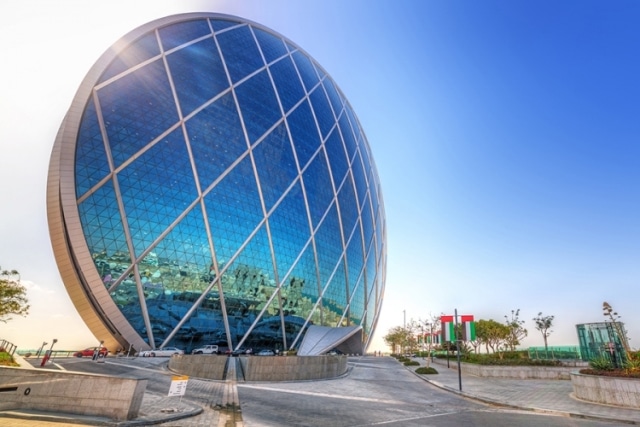Jun 17 2016
Although the modern day office buildings and high-rises with wide glass façades could be aesthetically very pleasing, they can really cost a lot. The glass façades allow in visible light along with infrared light that can raise the temperatures of the buildings and ultimately lead to more air-conditioning use as well as higher energy consumption levels in extreme hot and desert climates like the UAE.
 The iconic Aldar Headquarters building in Abu Dhabi has a panoramic glass façade glazed with energy-efficient low emissivity coated glass. Masdar Institute Assistant Professor Dr. Adel Gougam may have found a way to significantly reduce the cost and complexity of manufacturing energy-efficient glass coatings.
The iconic Aldar Headquarters building in Abu Dhabi has a panoramic glass façade glazed with energy-efficient low emissivity coated glass. Masdar Institute Assistant Professor Dr. Adel Gougam may have found a way to significantly reduce the cost and complexity of manufacturing energy-efficient glass coatings.
The energy levels required to ventilate and cool all glass structures can make them exceedingly heavy users of resources, having both economic and ecological consequences. Due to this, glazing technologies, the specific coatings that can either increase or decrease the light and heat levels passing through the glass based on the building’s requirement, can play a vital role in the glass manufacturing as well as the sustainable urban development in the future.
In reality, scientists predict that the enhanced glazing can minimize the cooling load of a building by 20% upwards, and this is important in a nation like the UAE where air-conditioning alone consumes up to 75% of electricity during the peak day in summer. However, manufacturing the required glass glazing is not that simple, and therefore, not inexpensive.
Although recent advances in glazing technologies have helped reduce heat transfer in glass buildings, the complex, multi-layered coatings that have been developed are often expensive and difficult to manufacture, adding to the glass’ economic and ecological costs.
Masdar Institute’s Assistant Professor of Mechanical and Materials Engineering Dr. Adel Gougam.
Therefore, the challenge posed is to find novel ways to enhance glazing such that the costs of manufacturing remain at a low level and at the same time ensure that the natural, colorless appearance of glass is not altered, like some heat-blocking coatings that change the color of the glass, providing a less pleasing reddish or brown appearance.
In an attempt to make more energy-efficient and sustainable glasses for all buildings, Dr. Gougam is heading a team of investigators from the Masdar Institute that has created an inexpensive glass coating, which can considerably decrease the level of heat that goes through the glass while reducing manufacturing costs. This new glazing technology may provide the glass manufacturing sector in the UAE a significant and competitive benefit in the region, as builders are looking out for more sustainable building materials as the demand for more eco-friendly green buildings are growing.
Standard coatings attain high selectivity, a measurement that points out how effectively a coating can block heat and at the same time allow in sunlight, by filling several layers, normally about five, of varying thicknesses and compositions on a glass sheet. Today, nearly all coatings use costly silver nanolayers packed in between other layers of different materials.
In response to this, we have developed a glass coating made of a single layer of cheap, metallic oxide material that can block heat at nearly the same rate as the highest performing multi-layered coatings currently on the market, while minimizing manufacturing costs.
Dr. Adel Gougam
The process of creating these multi-layered coatings is very expensive and complex. All layers are placed in order over the glass pane with the help of a physical vapor deposition technique. Using this technique, nanoparticles from a target material, for instance silver, are eliminated by gas molecules and these molecules, powered by electricity, rapidly hit against the target material. After that, the eliminated nanoparticles are deposited on the glass pane. This physical vapor deposition technique is repeated several times in standard coatings to form the multi-layered coatings.
In order to make this unique glass coating, Dr. Gougam and his collaborates use the metal oxide-based material, which when coated on the pane of a glass, can allow in sufficient amount of sunlight by preventing solar infrared radiation and keep the natural and neutral appearance of the glass at a relatively lower manufacturing cost as opposed to standard coatings.
By avoiding the need to repeat the vapor deposition technique several times, we have reduced the complexity and energy requirement of the manufacturing process, as well as the manufacturing cost, contributing to a more sustainable production process and product.
Dr. Gougam
A poster explaining the research work was exhibited at the 2016 Materials Research Society (MRS) Meeting and Exhibit held in Phoenix, USA, in March and it was chosen as one of 30 nominated posters for Best Poster Award.
Dr. Gougam is planning to explore ways to enhance the metal oxide coating further and keep the manufacturing process cost-effective and as simple as possible. Next, he intends to improve the coating to make sure that the same amount of selectivity is attained on a larger glass pane and carry out environmental tests to assure the long-term sustainability and appropriateness of the coating in the hot climate of UAE.